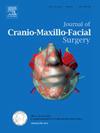Does the anatomy around the pterygomaxillary suture contribute to the risk of bad fractures in Le Fort I osteotomy?
IF 2.1
2区 医学
Q2 DENTISTRY, ORAL SURGERY & MEDICINE
引用次数: 0
Abstract
Le Fort I (LF1) osteotomy, a common orthognathic procedure for the maxilla aimed at achieving maxillary mobility by separating the pterygomaxillary suture, poses a risk of bad fracture that may lead to complications and inadequate mobility. Our study analyzed two- and three-dimensional computed tomography images to identify the anatomical factors associated with bad fractures due to an LF1 osteotomy.
Point ‘a’ is where the lateral pterygomaxillary suture on the axial image aligns with the zygomatic alveolar line near the line used for an LF1 osteotomy, with the base line connecting the bilateral ‘a’ points.Two risk factors were identified on the pterygoid side: (i) when the distance from point ‘a’ to the intersection of the base line and the medial pterygoid plate was <6.0 mm; and (ii) when the distance from the piriform aperture margin to the base line was <44.78 mm. Six risk factors were identified on the maxillary side, including the distance between the most anterior and most lateral points of the internal surface of the maxillary sinus being <31.9 mm. Our analyses revealed that fractures that occur during pterygomaxillary suture separation in an LF1 osteotomy are influenced by anatomical factors of the maxilla and pterygoid process, which form the pterygomaxillary suture.
翼颌缝周围的解剖结构是否会导致 Le Fort I 截骨术中发生骨折的风险?
Le Fort I(LF1)截骨术是一种常见的上颌骨正颌手术,其目的是通过分离翼颌缝来实现上颌骨的活动度,但该手术存在不良骨折的风险,可能导致并发症和活动度不足。我们的研究分析了二维和三维计算机断层扫描图像,以确定与 LF1 截骨造成的不良骨折相关的解剖因素。a "点是轴向图像上翼颌面外侧缝线与颧骨齿槽线对齐的位置,靠近用于 LF1 截骨的线,基线连接双侧 "a "点。
本文章由计算机程序翻译,如有差异,请以英文原文为准。
求助全文
约1分钟内获得全文
求助全文
来源期刊
CiteScore
5.20
自引率
22.60%
发文量
117
审稿时长
70 days
期刊介绍:
The Journal of Cranio-Maxillofacial Surgery publishes articles covering all aspects of surgery of the head, face and jaw. Specific topics covered recently have included:
• Distraction osteogenesis
• Synthetic bone substitutes
• Fibroblast growth factors
• Fetal wound healing
• Skull base surgery
• Computer-assisted surgery
• Vascularized bone grafts

 求助内容:
求助内容: 应助结果提醒方式:
应助结果提醒方式:


